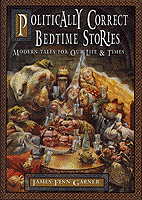

I have never been a supporter of the politically correct. The
self-righteous tone of the entire movement strikes a nasty chord with
my psyche, turns my stomach, and generally angers me to no end. Thus,
it was with great pleasure and many an evil chuckle that I read James
Finn Garner's Politically Correct Bedtime Stories.

Stories is a collection of famous fairy tales purportedly
altered to "reflect more enlightened times". To this end, all of the
stories in the collection have had all "sexist, racist, culturalist,
nationalist, regionalist, ageist, lookist, ableist, sizeist,
speciesist, ..." (the list goes on) biases removed. Unsurprisingly,
altering the stories entailed changing all of the endings that haunted
the old, biased versions, as well as some of the elements within the
body of the tale. For instance, while Chicken Little begins with
its non-human animal protagonist thinking the sky is falling, as in the
original version, it winds its way through Chicken Little and her
friends' quest to find a lawyer who can help them start legal action to
receive monetary compensation for various things they feel are wrong
with themselves.
"We're looking for someone to sue!" they shouted in unison.
"What are your grievances? Personal injury? Discrimination? Intentional infliction of emotional distress? Negligent infliction of emotional distress? Tortious interference? The tort of outrage?"
"Oh, yes, yes," they said excitedly, "all that and more!"
I will not spoil the ending, but needless to say, it is quite fitting and oh so PC. However, I will say that my favorite tale of the collection is Snow White, which touches on "colorist thinking", physical appearance and notions of self-worth, the men's movement, impotence, and sisterhood.
The intense humor of the collection affects the reader in two ways. First, all the stories are just downright funny. The contrast of fairy tales and modern issues makes for many surprises and shocking alterations of the tales we grew up with such that there is no alternative but to give in to laughter. Second, humor can be a much more effective weapon than pure argumentation, and it is obvious that Garner is quite aware of this. After the echoes of laughter die away, disturbing thoughts concerning the true intentions and effects of political correctness are left, as are questions with the means by which these effects are brought about. In any case, this book can be read on many different, distinct levels, each of which are thoroughly enjoyable.
Therefore, if you are in the mood to read something different, need a good laugh, or are just curious about how all the fairy tales you were told when you were young would come out after having their "biases" filtered, then Garner's Stories is definitely up your alley. In fact, just reading such titles as The Three Codependent Goats Gruff might make purchasing this book worth it to you.

